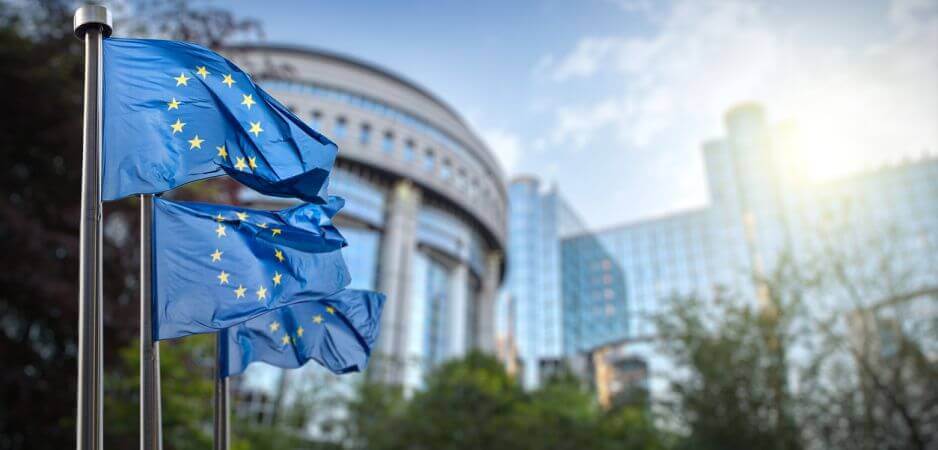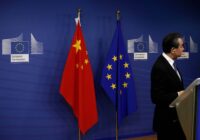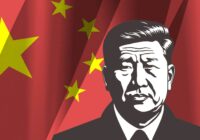A crumbling Europe consumed by nationalism, petty infighting and aggression could have an impact on the international order.
The international order is under siege in Europe. European Union (EU) and NATO nations once worked alongside the United States to expand a liberal, rules-based order across the globe. Today, those same countries struggle for the order’s survival at home. Amidst chaos in the Middle East and China’s rise in Asia, Europe — beset by Russian aggression from without and a crisis of liberalism from within — has become the bellwether for the international order. Should that order collapse in Europe under these dual strains, its prospects wane precipitously on the global stage.
Until recently, European nations were among the strongest proponents of the international order. As a collective security and economic community safely ensconced in “the end of history,” the expanding European project seemed to reflect the victory of democracy and markets over the 20th century’s ideological alternatives. A supposedly post-national, post-identity and post-conflict zone, the EU appeared the apogee of a liberal, rules-based system.
At the beginning of the 21st century, challenges appeared to stem exclusively from locales far from the land of espressos and euros. Following the 9/11 attacks, transatlantic attention centered on malignant non-state actors and poor governance in the Middle East, threats that eventually not only collapsed the state system in several countries, but also exported disorder beyond the region. In the Pacific, China’s economic rise and maritime revisionism threatened to spark renewed great power rivalry, creating perilous predictions of a “Thucydides Trap” that would end in conflict.
However, amid these more remote threats to the international order, European stability proved to be fragile. Economic crisis and nationalist movements currently threaten the commitment to liberal principles that first took root in Western Europe after World War II. A populist wave now imperils the liberal model that spread first to Central and Eastern Europe and then across the swathes of the globe. That third wave of democratization embedded a respect for individual rights, the rule of law and democratic institutions in domestic politics.
Today, democratic backsliding is already underway. Hungary’s Viktor Orban blazed a trail toward “illiberal democracy” — where the majority’s whims overrule checks on executive power or minority protections — praising the examples of Russian President Vladimir Putin and Turkish President Recep Erdoğan. Other Central and Eastern European leaders, such as Czech President Milos Zeman and the Polish governing Law and Justice Party, have followed similar paths. Doubts around the future of liberal democracy throughout the continent abound.
This shift toward illiberal democracy lands a twin blow against the liberal pillar of the international system.
First, the failure of these democracies will fuel rivals who propose alternative arrangements like authoritarian capitalism. Reformers outside Europe previously held up these countries as a guiding light. In the future, they will find both weaker moral and pragmatic cases for pursuing the European path.
 Second, a wider collapse of liberalism in Europe would replace a group of countries that have ardently supported the global system with neutral actors, or even revisionists. As Robert Kagan argued in The World America Made, the current international order is liberal in character — promoting non-aggression, open markets and human rights — only because the strongest powers are liberal. In normal times, Europe’s removal of support, or active opposition, would cripple the international order. At a moment when the United States is questioning its traditional stewardship of that system, the failure of European liberalism would be a death knell for the order’s very nature.
Second, a wider collapse of liberalism in Europe would replace a group of countries that have ardently supported the global system with neutral actors, or even revisionists. As Robert Kagan argued in The World America Made, the current international order is liberal in character — promoting non-aggression, open markets and human rights — only because the strongest powers are liberal. In normal times, Europe’s removal of support, or active opposition, would cripple the international order. At a moment when the United States is questioning its traditional stewardship of that system, the failure of European liberalism would be a death knell for the order’s very nature.
RUSSIA AND CHINA
At Europe’s periphery, Russia compounds these challenges by subverting the cornerstone of a rules-based order: the prohibition on altering borders by force. The invasion of Ukraine is only the most recent example of Moscow eroding the European security order that denies it a sphere of influence. Following World War II, European nations pioneered norms against territorial revisionism. Signatories to the 1975 Helsinki Final Act, including Russia, declared “inviolable all one another’s frontiers as well as the frontiers of all states in Europe.” These tenets, reaffirmed in the 1990 Charter of Paris for a New Europe, are now wantonly disregarded by Russia’s actions in Georgia and Ukraine.
If unchecked, Moscow’s use of force will continue to erode this norm, which would open the gates for worldwide revisionism. Within Europe, illiberal parties already chafe at perceived territorial injustices (such as the Treaty of Trianon).
Similarly, in Asia, China is pursuing maritime claims at the expense of its neighbors that could spiral into conflict. Beijing and Moscow have different aims and complaints vis-à-vis the international order. Nevertheless, China is watching and learning from Russia’s efforts to reacquire a sphere of influence. Russia’s present challenges, therefore, are akin to sawing into the legs supporting a table, making it more susceptible to collapse.
Under this two-pronged assault, Europe has returned to the fore of geopolitics. While challenges in Asia and the Middle East will undoubtedly impact the international order, a crumbling Europe consumed by nationalism, petty infighting and aggression would decisively tip the global scale against the system’s immediate future. Saving a liberal, rules-based order in Europe alone is not sufficient to rescue it worldwide, but the survival of the order in Europe remains a necessary precondition. If lost there, its future is bleak everywhere.
*[Young Professionals in Foreign Policy is a partner institution of Fair Observer.]
The views expressed in this article are the author’s own and do not necessarily reflect Fair Observer’s editorial policy.
Photo Credit: Art.Jazz
Support Fair Observer
We rely on your support for our independence, diversity and quality.
For more than 10 years, Fair Observer has been free, fair and independent. No billionaire owns us, no advertisers control us. We are a reader-supported nonprofit. Unlike many other publications, we keep our content free for readers regardless of where they live or whether they can afford to pay. We have no paywalls and no ads.
In the post-truth era of fake news, echo chambers and filter bubbles, we publish a plurality of perspectives from around the world. Anyone can publish with us, but everyone goes through a rigorous editorial process. So, you get fact-checked, well-reasoned content instead of noise.
We publish 2,500+ voices from 90+ countries. We also conduct education and training programs
on subjects ranging from digital media and journalism to writing and critical thinking. This
doesn’t come cheap. Servers, editors, trainers and web developers cost
money.
Please consider supporting us on a regular basis as a recurring donor or a
sustaining member.
Will you support FO’s journalism?
We rely on your support for our independence, diversity and quality.






